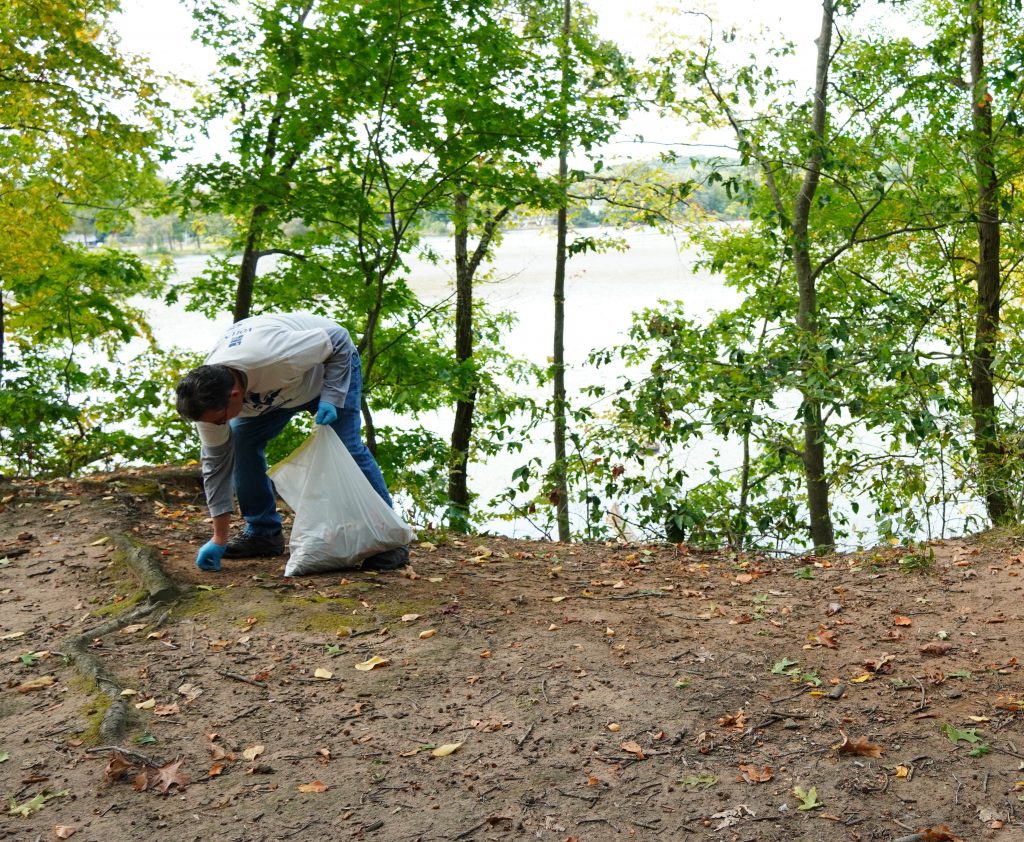By Lindsay Skedgell

Hanover Pond in Meriden, CT was peaceful that Saturday morning, the last full day of Summer 2024, as volunteers from across the state peeked under brush and along trails to pick up trash that had been discarded in the weeds or the tree roots. With trash grabbers and gloves, they eyed each trail, hiked down slopes, sifted through piles of leaves, and held conversations about their lives, what brought them to a cleanup that day, and where they had traveled from to be there.
The experience probably was largely similar across more than a dozen cleanups that took place across Connecticut that day as a part of International Coastal Cleanup Day, a worldwide effort led by the Ocean Conservancy to clean up loved parks and coastlines worldwide. Save the Sound has been the Connecticut coordinator for the International Coastal Cleanup since 2002.
This past year, Mar Parsaye joined Save the Sound as seasonal cleanup coordinator alongside our longtime cleanup coordinator, Annalisa Paltauf, working to organize that Hanover Pond cleanup and cleanups across Connecticut and New York from April to November. What inspired her to get involved with cleanups?
“I have always loved nature and being outdoors and having access to clean water and all the things that we are afforded by having a sustainable world,” Parsaye said. “In both my personal and professional life, I was hearing about and experiencing the consequences of climate change, and I wanted to do more to help impact a positive change in our world. That led me to Save the Sound and the cleanup program.”
The 2024 cleanup season saw 3,167 volunteers pick up 11,383 pounds of trash—that’s more than 5.5 tons of trash, or about one adult African elephant’s worth—at 92 cleanups across Connecticut and New York. The most common trash types collected were 16,593 cigarette butts, 12,578 food wrappers, 11,935 bottle caps (pretty much a 50-50 split between plastic caps and metal ones), and 9,977 small plastic pieces. Those items have remained the most significant trash types for the past eight years. Full data from 2024 can be found at savethesound.org/what-we-do/healthy-waters/cleanups-and-marine-debris/
“Many people are surprised to learn that cigarette butts are composed mainly of plastic—specifically, cellulose acetate,” said Paltauf. “Because plastics don’t decompose, improperly discarded cigarette butts stick around for a very long time, creating visible pollution and contributing to leaching of harmful chemicals into our ground and water.”
Some of the strangest items found during last year’s cleanup season included an air conditioner window unit, a brand-new boat seat, a broken lobster trap, a highway speed limit sign, and a boomerang. More disheartening discoveries included several animals harmed by discarded trash, such as a dead seagull with plastic in its beak and a dead vole in a beer bottle, which clearly illustrated the impact of trash on wildlife.
Data collected by cleanup captains each year includes trash type, total weight, and number of trash pieces, which is then used to advocate for policy change in Connecticut, New York, and beyond.
“I was surprised to learn how effective legislation can be,” Parsave reflected. “We collected less beer bottles this year because of the bottle deposit increase. The same thing with plastic grocery bags. We find way fewer now because of Connecticut’s enacted ban.”
That’s huge, considering that glass bottles can take up to a million years to decompose, according to the Ocean Conservancy’s “Pocket Guide to Marine Debris.”
Cleanup Season 2025 will get underway with three Earth Day events: Saturday, April 26 at Veterans Memorial Park in Norwalk, CT (9:30-11:30 a.m.), Rye Town Beach in Rye, NY (10:00 a.m.-12:00 p.m.), and Sunday, April 27 along the perimeter of Six Lakes in Hamden, CT (12:00-2:00 p.m.).
Register for these cleanups and find out about other public cleanups as they are scheduled at savethesound.org/take-action/upcoming-events/ ■
Save the Sound works across the Long Island Sound region to protect the Sound and its rivers, fight climate change, save endangered lands, and work with nature to restore ecosystems. More info at savethesound.org.




